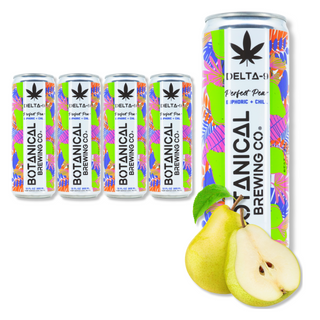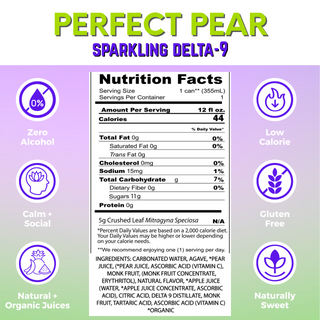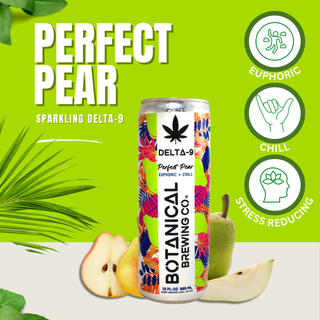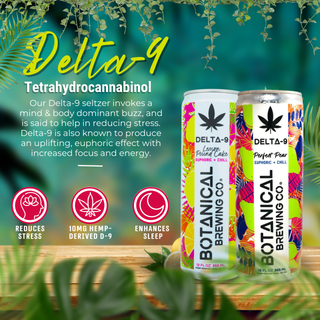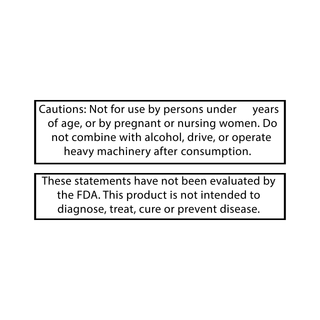Introduction
Delta-9 THC is the main psychoactive component of cannabis that causes euphoria and alters the perception of reality. With its increasing popularity in medical and recreational use, the issue of safety is becoming extremely relevant. Is Delta-9 safe? It is important to be aware of potential risks, side effects, and proper dosage to avoid possible health problems, such as mental disorders or negative effects on the cardiovascular system. This guide will help you understand if Delta-9 is safe for your body.
Delta-9 uses
Delta-9 THC is actively used for both medical and recreational purposes due to its psychoactive and therapeutic properties. However, it is important to understand how these two uses differ.
Main areas of medical use
Delta-9 THC has a wide range of medical uses due to its analgesic, anti-inflammatory, and anxiolytic properties. It is prescribed for patients with chronic pain, such as cancer or multiple sclerosis, where other treatments are less effective. Delta-9 also helps treat nausea and vomiting after chemotherapy. In addition, it is used to stimulate appetite in patients with HIV/AIDS, as well as to reduce anxiety and stress in people with post-traumatic stress disorder (PTSD). However, its medical use requires caution due to potential psychoactive effects and possible adverse reactions.
Recreational use and popularity of Delta-9
For recreational purposes, Delta-9 THC has gained widespread popularity for its ability to induce feelings of euphoria, altered perception, and relaxation. Many users use Delta-9 to relieve stress after a stressful day or for social situations. It is also popular among people looking to boost their mood or creativity. The legalization of Delta-9 in many US states has contributed to its spread among recreational users. However, its strong psychoactive effects can lead to adverse reactions such as anxiety or paranoia, especially in case of overdose or regular use.
Potential risks and side effects of Delta-9
Delta-9 THC, like any psychoactive substance, has certain physical and mental health risks. Many people ask, "is Delta-9 bad?" or "is Delta-9 good?" Understanding its effects on the body and possible side effects is important for responsible use of this substance. While Delta-9 can offer therapeutic benefits, such as pain relief and relaxation, it can also lead to negative outcomes like anxiety or cardiovascular issues if used irresponsibly.

Psychoactive effects of Delta-9
How does Delta-9 affect the mental state?
Delta-9 THC directly affects the cannabinoid receptors in the brain, causing an altered perception of reality, feelings of euphoria, and general relaxation. This effect on the brain can change mood, reduce stress and anxiety, but in some people, the psychoactive effects can be too strong and lead to negative consequences.
Potential risks: anxiety, paranoia, psychosis
In some users, Delta-9 can cause severe anxiety, especially when consumed in high doses. This can manifest itself in the form of sudden panic attacks or exacerbated anxiety. There may also be feelings of paranoia, when users lose touch with reality or experience an unexplained fear of danger. In severe cases, especially in people with mental illness, Delta-9 can trigger psychotic episodes or exacerbate existing problems. Therefore, people at increased risk of developing mental disorders should avoid taking large doses of Delta-9.
Physical side effects of Delta-9
How does Delta-9 affect the cardiovascular system?
Under the influence of this substance, the heart rate often accelerates, which can lead to high blood pressure. This can be especially dangerous for people who already have heart problems or high blood pressure. Long-term and regular use of Delta-9 may also increase the risk of developing cardiovascular disease.
Possible side effects on the respiratory tract
Smoking or vaporizing Delta-9 can have negative effects on the respiratory system. As with any inhaled substance, smoking Delta-9 causes irritation of the airways, which can lead to chronic cough, bronchitis, or other respiratory problems. This is especially true when smoking cannabis flowers, when toxic combustion products enter the body. To minimize the risks, some users prefer to consume Delta-9 in the form of edibles or tinctures, which does not harm the respiratory system.
Delta-9 addiction
Can Delta-9 be addictive?
Delta-9 THC has the potential to cause both psychological and physical dependence. Psychological dependence manifests itself in the form of a constant desire to repeat the euphoric feeling associated with use. Over time, some users may have difficulty controlling their dose or frequency of use, which can negatively impact their daily lives.
How does tolerance to Delta-9 develop?
With regular use of Delta-9 THC, the body begins to adapt to its effects, and users need to consume increasingly larger doses to achieve the same effect. This phenomenon is known as tolerance. The development of tolerance increases the risk of overdose when users take excessive doses in an attempt to experience the same effects. This development can lead to dependence, where the body needs Delta-9 to maintain a habitual state, and attempts to stop using it can cause withdrawal symptoms such as anxiety, irritability, and insomnia.
Thus, Delta-9 THC, although it has significant therapeutic potential, is associated with a number of risks. Psychoactive and physical side effects, as well as the possibility of addiction, require a responsible approach to its use.

Safe Delta-9 dosage
Choosing the right Delta-9 dosage is key to the safe use of this substance, both for beginners and experienced users. The right dosage helps to avoid side effects and make use as comfortable as possible.
How to choose the right dosage for beginners
It is recommended that beginners start with low doses to gradually get used to the effects of Delta-9. The optimal starting dose for beginners is 2.5-5 mg. This allows you to assess the body's response without the risk of serious side effects such as anxiety or paranoia. After initial use, you should wait 1 to 2 hours to fully understand the effects. If the effects are too weak, the dose can be increased gradually by 1-2 mg until the desired result is achieved.
Dosage for medical and recreational purposes
For medical purposes, the dosage depends on the patient's health status and the doctor's recommendations. Usually, medical doses of Delta-9 start at 2.5-10 mg per day and can be increased depending on the individual needs of the patient. In cases where Delta-9 is used to treat chronic pain or serious conditions such as cancer or multiple sclerosis, doses can be significantly higher, but under strict medical supervision.
Recreational users typically consume Delta-9 in doses ranging from 5 to 20 mg per use, depending on the desired effect. It is important to consider individual tolerance, as excessive doses can lead to severe side effects.
Signs of Delta-9 overdose
An overdose of Delta-9 can have serious consequences. The main signs of an overdose:
- Severe anxiety or panic attacks.
- Disorientation and paranoia.
- Increased heart rate.
- Nausea and vomiting.
In case of overdose it is recommended:
- Drink plenty of water.
- Rest in a quiet place.
- If necessary, consult a medical professional, especially in case of respiratory or heart problems.
Maintaining the correct dosage will help to avoid unwanted effects and make the use of Delta-9 as safe as possible.

Safe Delta-9 dosage
The correct dosage of Delta-9 depends on the method of use, as each method affects the speed of action and duration of the effects. Let's take a look at the main methods of use and dosage recommendations.
Smoking and vaporizing
Smoking and vaporizing provide a quick effect because THC enters the bloodstream through the lungs. The effect comes after a few minutes and lasts up to 2-3 hours.
- Starting dose: 1-2 inhalations for beginners.
- For experienced users: 3-5 inhalations.
Smoking can irritate the airways, so vaporizing is a less harmful alternative.
Beverages
Drinks with Delta-9 provide a mild and long-lasting effect, but the effect may take 30 minutes to 2 hours to appear.
- Recommended initial dose: 2.5-5 mg.
- Duration of action: 4-6 hours.
Drinks are safer for the respiratory tract, but require careful dosing due to the delayed effect.
Edible products
Edibles, such as cookies or gummies, have a delayed effect, which can lead to overdose if an additional dose is consumed before the effect occurs.
- Initial dose: 2.5-5 mg.
- Duration of effect: 6 to 8 hours.
Repeated use should be avoided until the full effect occurs.
Oils and tinctures
Oils and tinctures can be taken under the tongue for rapid absorption. This allows for better dosage control.
- Initial dose: 1-2 drops (equivalent to 2-5 mg of THC).
- The effect begins in 15-30 minutes and lasts 4-6 hours.
Oils and tinctures provide more precise dosage, especially for medical purposes.
For safe use, it is important to start with low doses and gradually increase them, taking into account individual body reactions.
Interaction of Delta-9 with other substances
Delta-9 THC can interact with alcohol and medications, which affects the body and increases the risk of side effects. It is important to be aware of these interactions for safe use.
Effects of Delta-9 on the body when consumed with alcohol
Combining Delta-9 with alcohol increases the psychoactive effects of both substances. Alcohol increases the absorption of THC, which can cause greater euphoria or anxiety, panic, and disorientation. It also increases the burden on the liver and heart, which is dangerous for people with cardiovascular disease. Therefore, it is advisable to avoid using Delta-9 and alcohol together.
Interaction with medications
Delta-9 may alter the effects of certain medications, such as antidepressants, anticoagulants, or blood pressure medications. This can increase or decrease the effect of the drugs, which affects their effectiveness. It is important to consult your doctor before using Delta-9 if you are taking medications on a regular basis.

Delta-8 and Delta-9 safety comparison
Delta-8 and Delta-9 THC are two similarly structured cannabinoids, but their safety and effects on the body have some differences. Both compounds have psychoactive effects, but with different levels of intensity and potential risks. When comparing the two, it's natural to ask, "is Delta-9 safer than Delta-8?" While Delta-9 tends to have stronger effects, Delta-8 is often considered milder and may have fewer side effects, making it a preferred option for some users. Understanding these differences will help you decide which compound is better suited for your needs.
|
Parameter |
Delta-8 THC |
Delta-9 THC |
|
Intensity of Effect |
Milder psychoactive effect |
Stronger psychoactive effect |
|
Anxiety Risk |
Lower |
Higher, especially in large doses |
|
Physical Side Effects |
Less pronounced |
More frequent changes in heart rate |
|
Duration of Action |
4 to 6 hours |
2 to 6 hours |
|
Safe Dosage |
10 to 30 mg |
5 to 20 mg |
|
Overdose Risk |
Low |
Higher, with stronger side effects |
|
Psychoactive Side Effects |
Rarely causes paranoia |
More frequent cases of anxiety and panic |
|
Legal Status |
More legal in many states |
Restricted, partially banned |
Delta-8 is considered a milder alternative to Delta-9, making it more suitable for beginners or those looking for milder psychoactive effects.
Conclusion
Delta-9 THC is a powerful cannabinoid with many possibilities for both medical and recreational use. However, its safe use requires caution, as high doses can lead to serious side effects such as anxiety, paranoia, and heart problems. It is important to consider the method of use and dosage, as well as individual body reactions.
Ultimately, the choice between Delta-8 and Delta-9 depends on the user's needs. Delta-8 is suitable for milder effects, while Delta-9 provides stronger psychoactive effects, making it less safe in high doses.



